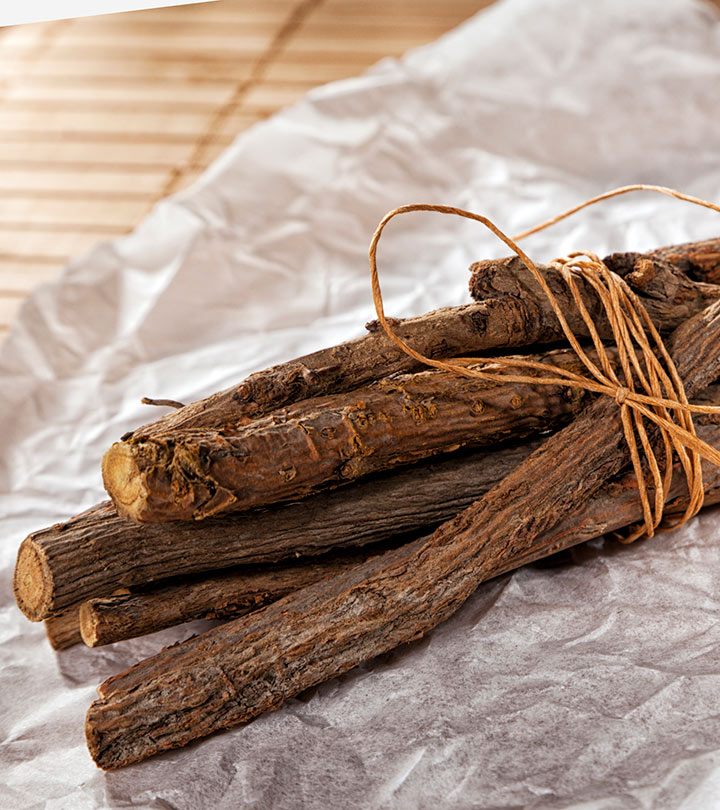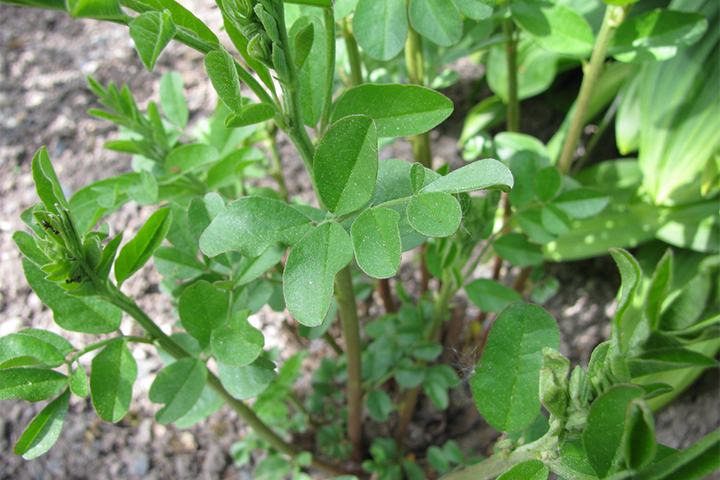Licorice is a herbal plant whose root (licorice root) is a purported galactagogueiXA food or substance that increases the flow of breastmilk. However, since research suggests otherwise, you would want to know if using licorice when breastfeeding is safe. Knowing the answer to this question is necessary to prevent any adverse effects that licorice may have on the nursing mother and her baby.
You can find powdered licorice in several over-the-counter (OTC) products, such as candies and sweeteners. So, reading the product label when buying a food product is necessary to ensure you eat items safe for you and your nursing baby.
Read on to know more about licorice, its safety for lactating mothers and their babies, and the possible side effects it can cause.
What is Licorice?
Licorice is a herbal plant also known as Glycyrrhiza, a name derived from ‘glukos’ that means sweet while ‘riza’ refers to root. Licorice root holds the compound ‘glycyrrhizin’, which is almost 50 times sweeter than sugar. This sweetness makes it an ideal component for confectioneries and beverages. It is a perennial herb mostly found in Southern Europe and parts of Asia as well as popular in South Asia. Licorice is known to consist of numerous substances that have potential healing properties, such as flavonoids and other phytoestrogens (plant-based compounds). It has been used for its medicinal properties for over centuries. In ancient Arabia, people used licorice to treat a cough, while in ancient Greece it helped to treat asthma and other respiratory illnesses. Licorice is an integral component of several Chinese herbal formulas and is believed to enhance the effects of other herbs. In Ayurveda, licorice is termed effective in relieving spasms and inflammations (1).
Licorice could also help treat gastrointestinal problems such as an upset stomach and gastric discomfort.
How Does It Work?
Licorice root plant is a part of the pea family. The chemical compounds present in licorice are said to have expectorantiXA medication used to expel mucus from the airways properties that make it effective against a cough and swelling.
These components are said to have anti-inflammatory, anti-oxidant, and anti-viral properties. Glycyrrhizic acid present in licorice boosts adrenal glandiXEither of the two glands located above the kidneys and produce hormones, including cortisol, adrenaline, and aldosterone function that helps to deal with depression and anxiety.
The German Standard License has indicated that licorice eases painful spasms that result from chronic gastritisiXProgressive inflammation of the stomach lining.
Side-Effects Of Licorice
Overconsumption of licorice can cause various side effects on maternal health, including hypertension, hormonal imbalances, cataractsiXA medical condition where the eye lens turns cloudy, fluid retention, and so on. People suffering from heart ailments must avoid licorice since it affects the adrenal glands, hormones, and blood pressure that can make the patient susceptible to heart failure. Excessive intake of licorice can aggravate kidney and liver disease and diabetes (2).
Is It Safe To Consume Licorice While Breastfeeding?
There is a lack of information about the effects licorice has for lactating mothers. However, the US National Institute of Health (NIH) has advised lactating mothers against the consumption of licorice as it can interfere with milk supply while breastfeeding (3).
Mothers who have consumed the herb in the past have complained about its side-effects. Consuming licorice can cause headaches, high blood pressure, heart ailments, or even swelling due to water retention. Pregnant women are asked to keep away from licorice as it can cause miscarriage, stillbirthiXTerm used to describe the birth of a fetus with no signs of lifeor preterm laboriXLabor that begins before the 37th week of pregnancy (3).
In certain cases, breastfeeding mothers, consuming more than 2 liters of herbal tea containing licorice, complained that their infants became very weak and weary. It was only after they stopped consuming herbal tea that the infants felt stronger and normal. It reduces the production of milk and interferes with lactation and breastfeeding (3).
Mothers, who are on diureticiXDrugs that increase the production and flow of urine medications must avoid using licorice due to its contraindication to such medications. It also increases the excretion of potassium in urine and actively drops potassium levels in the body (hypokalemia), and that can prove fatal in certain cases (4).
As a nursing mother, you must always consult your physician before taking any herbal product or even applying it topically.
Always read the ingredients of the herbal products you purchase. Buy products only from reputed brands.
Avoid consuming large quantities or prolonged use of licorice.
Anecdotally licorice is famous as a galactagogue. However, you may already know that experts and government officials advise against using licorice during breastfeeding as it may have adverse effects on maternal and infant health. Licorice is present in several OTC products as sweeteners. Therefore, read the labels carefully before consuming packaged goods. Before purchasing any herbal teas or powders, you should consult your doctor to prevent adverse effects. Licorice may react adversely with certain medications and hence should be used cautiously.
Key Pointers
- Licorice is a herb with a root that contains glycyrrhizin, which is sweeter than sugar.
- It is known for its medicinal properties, including antioxidant, anti-inflammatory, and antiviral effects.
- Overconsumption of licorice may lead to side effects such as hypertension, fluid retention, and an increased risk of diabetes and liver diseases.
- Expectant mothers should consult their doctor before consuming large amounts of licorice or using it for topical application.
Explore the amazing benefits of licorice root and also the risk factors associated with its use. Discover how this powerful herb can help you!













